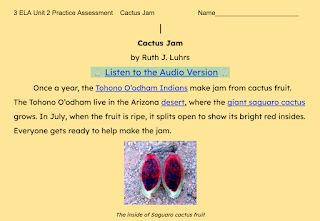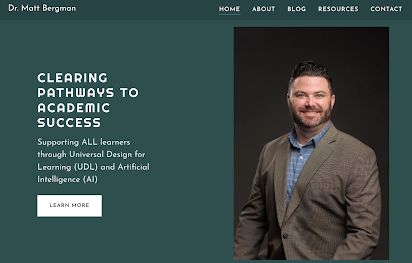Imagine you have decided to give students the same reading assignment in your room. The learning goal states that all students will read the same article; however, you realize there is tremendous variability in your classroom. How do you plan with variability in mind?
The Universal Design for Learning (UDL) framework is a proactive framework for designing accessible and engaging lessons for all students. It is based on brain research and states that there are typically three types of barriers and ways to plan for those barriers proactively.
How students engage in learning (Multiple Means of Engagement)
How students access learning (Multiple Means of Representation)
How students demonstrate their understanding (Multiple Means of Action and Expression)
Redesigning the look of a reading assignment to create access is something that is extremely easy to plan for, but is often overlooked. Here are 5 tips for using UDL to redesign the reading assignment with access in mind (aka Multiple Means of Representation).
Tip # 1: Change the Background Color
Research indicates that pure white backgrounds and black text can generate difficulties reading for students with Dyslexia and cream color backgrounds (light yellow, orange, etc.) are more conducive for reading. This can be done in Google Docs by visiting the File menu and choosing Page Setup.
Tip # 2: Use a Serif Font
Did you know that Sans Serif fonts (fonts without dashes at the end of each letter) are difficult for students with Dyslexia to read? Instead, use Serif fonts to make it easier for readers to identify letters, such as Calibri, Comic Sans, Open Dyslexic, and Lexend.
Tip # 3: Provide Options for Reading
Providing students with printed, digital, and audio options are helpful for increasing accessibility. Digital files in PDF format can easily be manipulated, annotated, and used with screen readers. Did you know that you can save a Google Doc in PDF format? Simply visit the File menu and choose Download as a PDF.
Tools like Adobe Reader, Speechify, and Read & Write for Google Chrome have built-in text-to-speech features to read PDF’s and Google Docs. In addition, Vocaroo makes it easy to create a voice-recorded audio version of the article.
Tip # 4: Build-In Background Knowlege
We cannot assume that all students have the same knowledge and background knowledge when providing reading assignments; therefore, helpful tools like videos and images are extremely helpful for building student understanding and context.
Many teachers find using YouTube 360 videos helpful for providing students with a customized video experience, where students can navigate 180 and 360-degree spherical videos.
Here is one of my favorite YouTube 360 videos!
Tip # 5: Hyperlink Important Vocabulary Terms
Do you know some of the vocabulary terms that students will have difficulty with? It may be helpful to add hyperlinks to important definitions students may need. Although there are many great online dictionaries available, you may want to consider doing a Google search for a specific definition.
For example, if you did a search for “definition of running,” Google would provide you with the definition, images, and an audio recording of how to pronounce the word running. Copy and paste this URL as a hyperlink in your document for students to access.
Conclusion
In conclusion, embracing the Universal Design for Learning (UDL) framework equips educators with the tools and resources needed to revamp reading assignments for accessibility and engagement. Implementing strategies like adjusting background colors, using readable fonts, offering diverse reading options, incorporating multimedia resources, and hyperlinking key vocabulary terms fosters an environment where all students can comprehensively access and engage with the material. UDL's proactive approach paves the way for a more equitable and enriching learning experience, accommodating the diverse needs and strengths of every learner.





